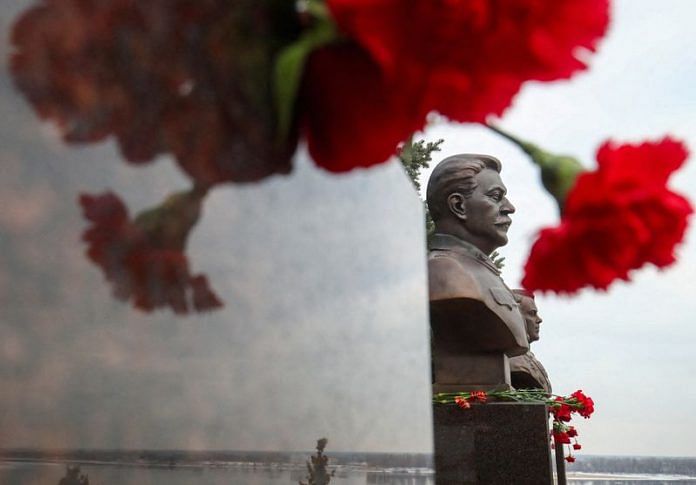By Roman Churikov and David Chkhikvishvili
MOSCOW/GORI, Georgia (Reuters) – On the eve of the 70th anniversary of Josef Stalin’s death, attitudes to the Soviet Union’s wartime leader remain mixed in the nations he once ruled with an iron fist.
During three decades of dictatorial rule, Stalin oversaw rapid industrialisation and victory over the Nazis but also the deaths of millions in purges, Gulag labour camps and famine.
With Russia embroiled in conflict again in Ukraine, in what the Kremlin says is a fresh existential battle for national survival, memories of the Soviet dictator loom large.
“Firstly, thank you for the victory (in World War Two),” said 21-year-old Madina in a typically mixed view of Stalin’s legacy among people on the streets of Moscow.
“Secondly, he is a negative person for me because there were a lot of deaths. A lot of executions, shootings, expulsions, arts were banned, etc. So it’s impossible to have a clear position one way or the other,” she added, declining to give her second name.
Stalin died on March 5, 1953, aged 74.
Though public commemorations remain largely taboo and streets no longer bear his name, his reputation has in recent years undergone something of a renaissance.
Polls in 2021 by Russia’s Levada Centre, for example, showed 45% expressing “respect” for Stalin while 48% backed installing monuments to him.
“Why should I have a bad attitude towards him?” said Moscow resident Andrei, 31, praising Stalin as a strong unifying personality whose war victory should be lauded.
Russian President Vladimir Putin, who casts himself as an heir to the tsars of the past, has offered a measured assessment of Stalin, praising his war leadership while condemning his domestic policies as “totalitarian”.
Since the start of the conflict in Ukraine, the Kremlin – which says it is fighting Ukrainian “Neo-Nazis” – has sought to claim Stalin’s wartime mantle, portraying its campaign as putting an end to unfinished business from World War Two.
BORN IN GEORGIA
In February, Putin visited Volgograd – which was briefly renamed Stalingrad – to commemorate the 80th anniversary of the battle that was a turning point in the war.
“Unfortunately we see that the ideology of Nazism in its modern form and manifestation again directly threatens the security of our country,” he said.
Ukraine says Putin is showing the same “genocidal” brutality as Stalin.
In Stalin’s hometown of Gori in Georgia, many share positive appraisals of the Soviet leader even though their nation has broken with Russia and support for Ukraine is widespread.
“The majority in Gori value Stalin, of course. As a historical figure, as a great man and a person who ruled with an iron fist,” said resident Jakob Kikriashvili, 48.
“But the attitude towards him is changing. The younger generation is more aggressive towards him.”
Born Ioseb Dzhugashvili to a humble family in 1878, the young Stalin spent his childhood in Gori, before studying in the nearby Georgian capital Tbilisi. Today, Gori’s Stalin museum, located on the town’s Stalin Avenue, is the town’s most famous tourist attraction, drawing visitors from across the world.
In 2010, the Georgian government ordered the town’s Stalin statue removed, saying he did not deserve it.
Tsotne Gogiashvili, a Gori resident in his early twenties, said that while older people in the town still “worship” Stalin, younger generations have changed their mind: “The majority of the young people do not like him, and I think that’s good.”
(Reporting by Reuters; Editing by Andrew Cawthorne)
Disclaimer: This report is auto generated from the Reuters news service. ThePrint holds no responsibilty for its content.



